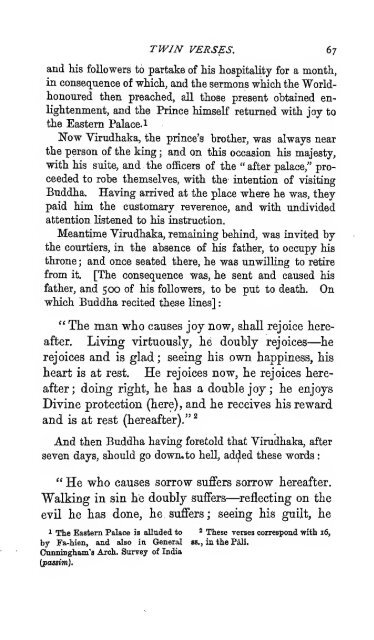Texts from the Buddhist canon : commonly known as Dhammapada
Texts from the Buddhist canon : commonly known as Dhammapada
Texts from the Buddhist canon : commonly known as Dhammapada
You also want an ePaper? Increase the reach of your titles
YUMPU automatically turns print PDFs into web optimized ePapers that Google loves.
TWIN VERSES. 67<br />
and hds followers to partake of his hospitality for a month,<br />
in consequence of which, and <strong>the</strong> sermons which <strong>the</strong> World-<br />
honoured <strong>the</strong>n preached, all those present obtained en-<br />
lightenment, and <strong>the</strong> Prince himself returned with joy to<br />
<strong>the</strong> E<strong>as</strong>tern Palace, i<br />
Now Virudhaka, <strong>the</strong> prince's bro<strong>the</strong>r, w<strong>as</strong> always near<br />
<strong>the</strong> person of <strong>the</strong> king ; and on this occ<strong>as</strong>ion his majesty,<br />
with his suite, and <strong>the</strong> officers of <strong>the</strong> " after palace," pro-<br />
ceeded to robe <strong>the</strong>mselves, with <strong>the</strong>' intention of visiting<br />
Buddha. Having arrived at <strong>the</strong> place where he w<strong>as</strong>, <strong>the</strong>y<br />
paid him <strong>the</strong> customary reverence, and with undivided<br />
attention listened to his instruction.<br />
Meantime Virudhaka, remaining behind, w<strong>as</strong> invited by<br />
<strong>the</strong> courtiers, in <strong>the</strong> absence of his fa<strong>the</strong>r, to occupy his<br />
throne ; and once seated <strong>the</strong>re, he w<strong>as</strong> unwilling to retire<br />
<strong>from</strong> it. [The consequence w<strong>as</strong>, he sent and caused his<br />
fa<strong>the</strong>r, and 500 of his followers, to be put to death. On<br />
which Buddha recited <strong>the</strong>se lines]<br />
" The man wlio causes joy now, shall rejoice here-<br />
after. Living virtuously, he doubly rejoices—he<br />
rejoices and is glad ; seeing his own happiness, his<br />
heart is at rest. He rejoices now, he rejoices here-<br />
after ; doing right, he h<strong>as</strong> a double joy ; he enjoys<br />
Divine protection (here), and he receives his reward<br />
and is at rest (hereafter)."^<br />
And <strong>the</strong>n Buddha having foretold that Virudhaka, after<br />
seven days, should go down. to hell, added <strong>the</strong>se words :<br />
" He who causes sorrow suffers sorrow hereafter.<br />
Walking in sin he doubly suffers—^reflecting on <strong>the</strong><br />
evil he h<strong>as</strong> done, he. suffers; seeing his guilt, he<br />
1 The E<strong>as</strong>tern Palace is alluded to ^ These verses correspond with 16,<br />
by Fa-hien, and also in General <strong>as</strong>., in <strong>the</strong> Pa.li.<br />
Cunningham's Arch. Survey of India<br />
{p<strong>as</strong>sim).<br />
:





